Related Research Articles

Stephanus Schoeman was President of the South African Republic from 6 December 1860 until 17 April 1862. His red hair, fiery temperament and vehement disputes with other Boer leaders earned him the moniker "Stormvogel den Noorden," "Storm bird of the North."
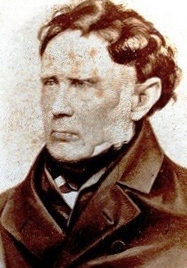
Sir Andries Stockenström, 1st Baronet, was lieutenant governor of British Kaffraria from 13 September 1836 to 9 August 1838.
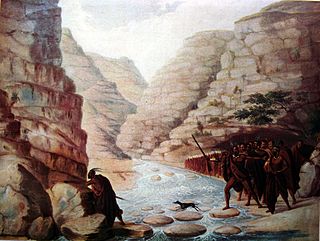
The Xhosa Wars were a series of nine wars between the Xhosa Kingdom and the British Empire as well as Trekboers in what is now the Eastern Cape in South Africa. These events were the longest-running military action in the history of European colonialism in Africa.

Sir Christoffel Joseph Brand was a Cape jurist, politician, statesman and first Speaker of the Legislative Assembly of the Cape Colony.

John Fairbairn was a newspaper proprietor, educator, financier and politician of the Cape Colony.

Justice Andries Stockenström, second son of Sir Andries Stockenström, was an influential judge in the Cape Colony. He was appointed Attorney-General of the Cape in 1877, but died soon after his appointment at the age of 36.

Field Cornet Andries Botha was an influential leader of the Khoi people of Kat River, Cape Colony.
Field Commandant Christian Jacobus Groepe (1789–1886) was a military leader of the Khoi people of Kat River, Cape Colony, in the nineteenth century.
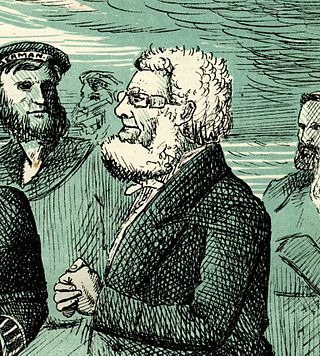
Dr Henry White, M.L.C. was a Member of Parliament and Treasurer General of the Cape Colony.

The Parliament of the Cape of Good Hope functioned as the legislature of the Cape Colony, from its founding in 1853, until the creation of the Union of South Africa in 1910, when it was dissolved and the Parliament of South Africa was established. It consisted of the House of Assembly and the legislative council.

Robert Godlonton (1794–1884) was an influential politician of the Cape Colony. He was an 1820 Settler, who developed the press of the Eastern Cape and led the Eastern Cape separatist movement as a representative in the Cape's Legislative Council.

The South African Commercial Advertiser was South Africa's first independent newspaper and started publication in Cape Town on 7 January 1824. It was banned between 5 May 1824 and 31 August 1825, and between 10 March 1827 and 3 October 1828, by order of the Governor at the Cape, Lord Charles Somerset.

Charles William Hutton MLC was a Member of the Cape Legislative Council and the country's Treasurer General during the Government of Prime Minister Thomas Scanlen.

The Koegas atrocities or Koegas affair (1878–80) was a notorious murder case in the Cape Colony, which led to deep political divisions and a follow-up campaign, due to the perceived racial bias of the country's Attorney General. It culminated in libel suits, filed by the government against several liberal leaders and news outlets.

Charles Lennox Stretch MLC, known locally as "Xolilizwe" ("peacemaker"), was a humanitarian, philanthropist, and a prominent member of the Parliament of the Cape of Good Hope.
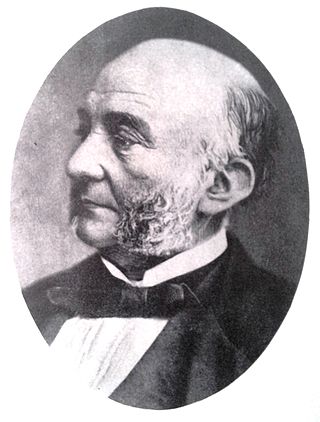
Francis William Reitz Sr. MLC MLA was an influential member of both houses of the Parliament of the Cape of Good Hope.
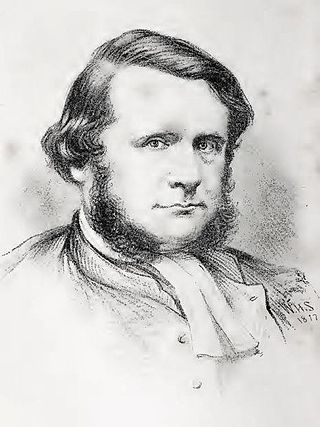
Egidius Benedictus Watermeyer, informally known simply as "Ben", was a Judge and a founding Member of the Cape Legislative Assembly.

Philippus Johannes Andries Watermeyer (1825-1897) was a prominent Member of the Cape Legislative Assembly.

The Eastern Province Separatist League was a loose political movement of the 19th century Cape Colony. It fought not for independence, but for a separate colony in the eastern half of the Cape Colony independent from the Cape government, with a more restrictive political system and an expansionist policy eastwards against the remaining independent Xhosa states. It was crushed in the 1870s, and many of its members later moved to the new pro-imperialist, Rhodesian “progressive party”.

The first election for the Parliament of the Cape of Good Hope was held in 1854. There were no clear party lines, however many representatives for Eastern electoral districts subscribed to a common programme which emphasised separation from the Cape Colony or moving the seat of colonial government eastward, a vagrancy law, or increasing the property qualification part of the franchise.
References
- ↑ Atlay, James Beresford (1901). "Watermeyer, Frederik Stephanus". In Lee, Sidney. Dictionary of National Biography (1st supplement) 3. London: Smith, Elder & Co. p.833-4.